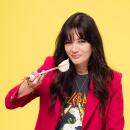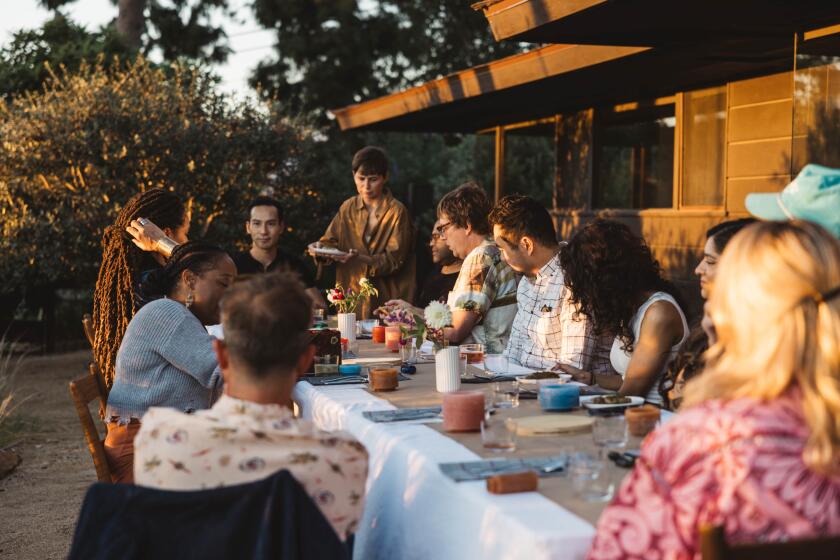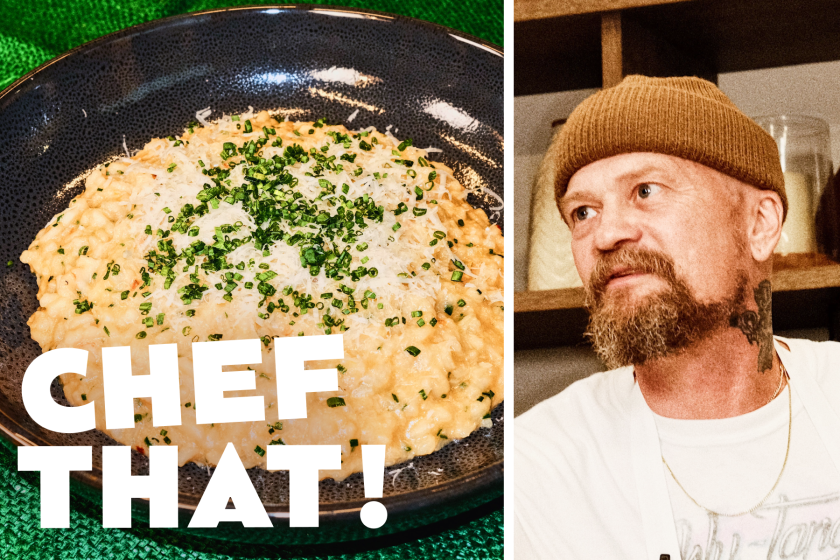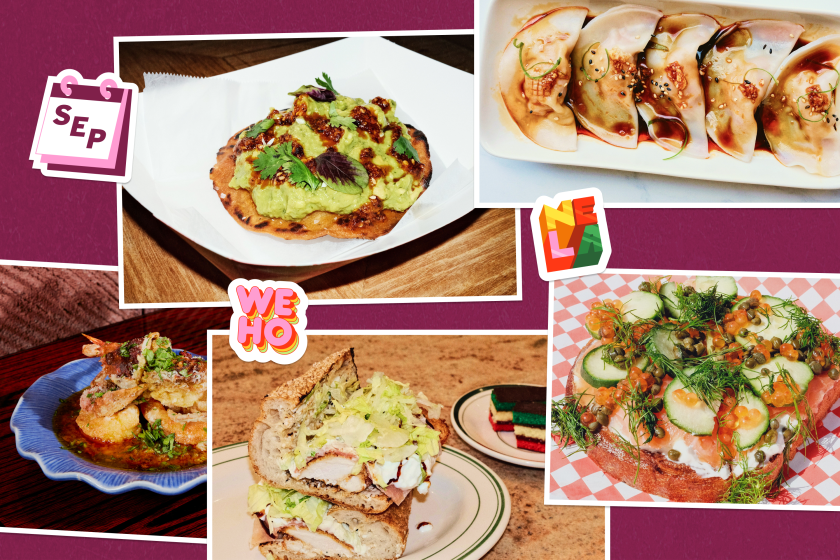From Kim Kardashian’s bestie to dining deity: The rise of Foodgod
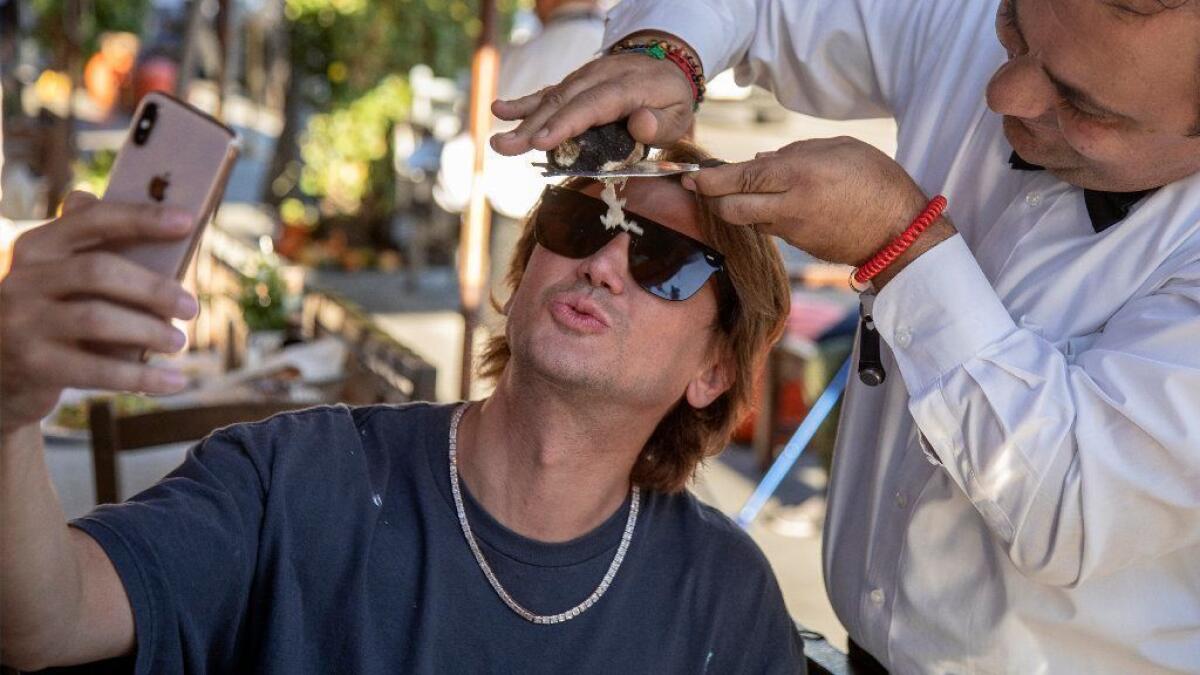
“I would consider myself more of a modern-day food critic. I want to go to a place where somebody sends me this insane cotton candy burrito and I’m like, this is amaaazing.”
Jonathan Cheban is not a food critic.
With his pouty lips, high cheekbones and windswept hair, Cheban, 44, looks like a daytime soap opera regular. He rose to C-list notoriety as Kim Kardashian’s BFF on “Keeping Up With the Kardashians” and its many reality television spinoffs. Not content to be a barnacle on the whale that is Kardashian fame, three years ago he rebranded himself as Foodgod, a manufactured celebrity for the Instagram age.
“I was like, ‘I feel like this is the time for me,’” he recalls of his metamorphosis. “And then I was like, ‘What’s my thing?’ I eat all day. I love to eat. My whole day revolves around food.” He says this as if the love of food is unique to him.
No matter that Cheban has no professional culinary background, or that his favorite ways to describe food are “wow,” “oh, my god” and “amaaazing” — he now has more than 3 million Instagram followers, asks for $30,000 appearance fee minimums and recently inked a multimillion-dollar, multiyear deal as the face of BurgerIM, a gig that has him working on new menu items for the Los Angeles company. (Among his first seven-figure-worthy directives for the fast-casual chain: Create a full-size burger — BurgerIM is known for its sliders — and request that the ranch dip be replaced with blue cheese.)
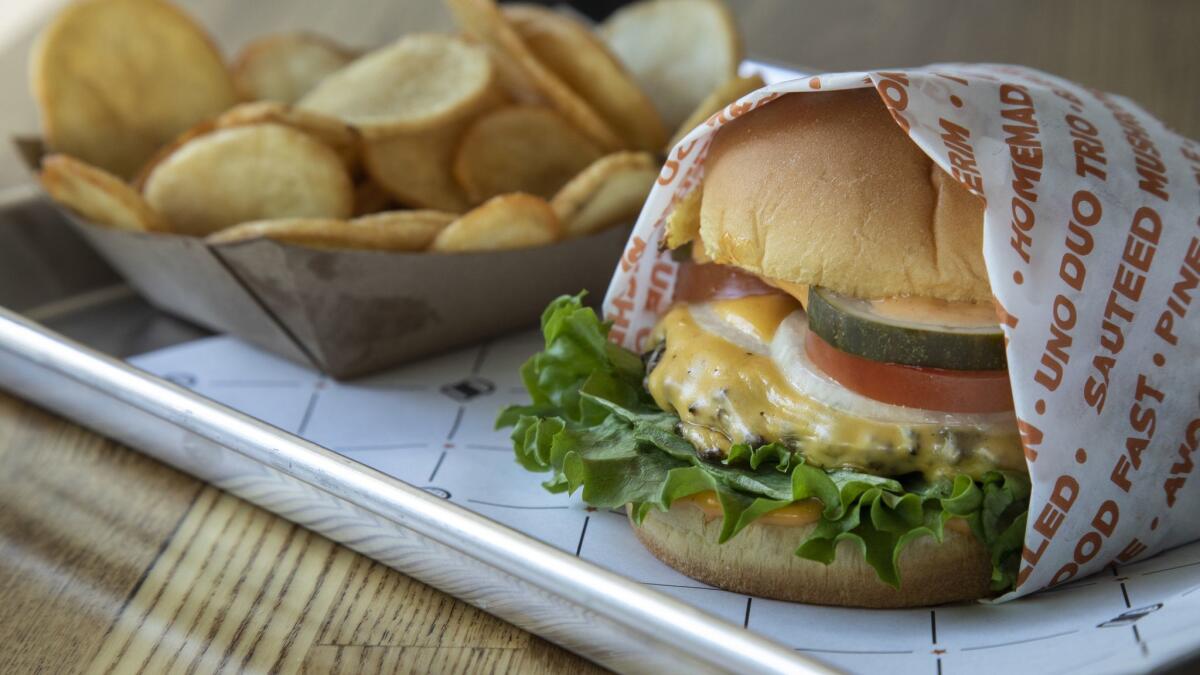
Foodgod’s existence and ascendance are, depending on your point of view, either an indictment of the fussiness of old guard food media or the most banal and possibly dystopian fulfillment of celebrated media theorist Marshall McLuhan’s most quotable maxims.
‘The medium is the message’
Foodgod has flourished in the social media world, where bloggers and influencers reach out to restaurants for free meals and other perks in exchange for Instagram posts. It’s a world where people, particularly millennials, turn to their social feeds for where and what to eat next — to watch an epic #noodlepull or a litter box-sized ice cream sundae being devoured. Where people like Cheban can invent a persona like Foodgod and — with the right amount of Kardashian adjacency — appoint themself a preeminent tastemaker.
So what’s in, according to Cheban? Giant rainbow-colored desserts, especially cotton candy and doughnuts. Taiwanese cheese tea. “The balloons that you can eat.” Anything that oozes, bursts or drips.
I can’t believe people even read food reviews and even listen to somebody that is so dated. It is so 2000. Literally. I didn’t even know that still exists.
— Jonathan Cheban, a.k.a. Foodgod, on traditional food media
Foodgod has a creed of sorts: Food should be as outrageous and outlandish as he is. And if it’s not, why bother?
“I give the food with fun,” he says while waiting for his cheeseburger and fries at the West Hollywood location of BurgerIM one recent afternoon. “It’s not just like, here’s a beautiful cheese soufflé. Don’t go to me for that. I want the cheese soufflé to explode.”
He’s especially vocal about what’s “soooo dated”: Things dipped in gold are out; so is the Instagram feature Boomerang. Lobster is overrated. His food idiosyncrasies could be classified as both absurd and mundane: Horseradish, mustard and cinnamon are evil. “Stuff not being crispy” is a sin.
“So dated” is also how Foodgod refers to traditional food media: “Just, like, miserable. I can’t believe people even read food reviews and even listen to somebody that is so dated. It is so 2000. Literally. I didn’t even know that still exists.”
Old-school restaurant critics, he argues, are just not relevant.
“It’s all, like, ‘It was dry, while the kitchen was backed up heavily during the maitre d’ running around while the fish was not fully cooked with ratatouille on the side,’” he says derisively of professionally written, thoughtful and reported restaurant reviews. “Like ratatouille: Are you serious? No. I want to know about how far the cheese pull was that day in the restaurant. No one cares about the texture of food.”
As far as Instagram is concerned, Foodgod might be onto something. In comparison with Cheban’s 3 million, Pete Wells of the New York Times, widely considered the most powerful restaurant critic in the world, has 35,100 Instagram followers.
Are you talking about the kid on Kardashian? I know he’s a reality star and he likes Nobu.
— Lukshon's Sang Yoon on Foodgod
Just as Cheban turns up his nose at traditional media, the serious food world seems equally unaware of Foodgod’s relevance.
“Never heard of him,” said Mozza chef Nancy Silverton.
“Unfortunately, I have no idea who that is,” said San Francisco Chronicle restaurant critic Soleil Ho.
“Are you talking about the kid on Kardashian?” asked Lukshon’s Sang Yoon. “I know he’s a reality star and he likes Nobu.”
‘All media exist to invest our lives with artificial perceptions and arbitrary values’
Foodgod’s origin story goes like this: Little Russian boy with big dreams moves to New Jersey with his mother and diamond-dealing father when he’s 6. He grows up a mall rat, leading a tedious life delivering food for Blimpie out of a burgundy Honda CR-X with a leather bra across the hood and eventually selling cookware and small electronics at Macy’s. He goes to college at Hofstra and drives himself into the city to “make connections.” At night, he watches “90210” and “Lifestyles of the Rich and Famous” with his mom, dreaming of a bigger life for himself.
He has a chance meeting with Kardashian at a birthday party and becomes her friend, earning a spot as her trusty sidekick in real life and on reality TV. A friend suggests the name Foodgod and Cheban kind of likes it. Once, in the middle of a mob scene at a food court with Kardashian and Kanye West, Cheban hears West call out to him over the roaring of the crowd and paparazzi. “Foodgod! Can you get me a Diet Coke?” And so he was christened by Ye under the bright yellow neon lights of the golden arches.
When we started shooting our show there was barely Twitter. The way the social media platforms have evolved has given everybody a whole new set opportunities.
— Kris Jenner
Reflecting on Cheban’s success, Kardashian matriarch Kris Jenner said the explosion of social media means anyone can fashion themselves into an expert.
“When we started shooting our show there was barely Twitter,” she said. “The way the social media platforms have evolved has given everybody a whole new set of opportunities.”
You could say that Cheban created opportunities for himself by turning his Instagram feed into a never-ending scroll of enormous turkey legs, pancakes, trays of nachos, crepes, cookies, sandwiches and hot dogs.
He insists his posts are not veiled ads that he’s getting paid for on the side, and that he pays for the food he eats “a lot of times.”
“It’s so authentic,” he says. “I drove 25 minutes to go get this cotton candy burrito. They don’t pay me. I lose money for the $50 Uber back and forth plus the foot massage that I stopped for on the way there. So it’s very, very authentic.”
The Foodgod stamp of approval can be huge for restaurants. After Cheban posted a photo of the rainbow bagels at the Bagel Store in Brooklyn a few years ago, owner Scot Rossillo said the shop’s Instagram account picked up 10,000 new followers in 24 hours.
“Overnight I got $200,000 in shipping orders,” Rossillo says. “The lines went around a city square block in Brooklyn. They waited seven hours to come inside.”
Cheban also claims that big companies, not just his millions of followers, including Popeyes Louisiana Kitchen, are copying him. Just months after he posted a video of 24-karat gold-covered chicken wings, the chicken chain released its own gold-coated wings.
“The fact that Popeyes copied me is insane,” Cheban says. “That’s a compliment. That Popeyes did gold wings, yeah I’m sure they were that creative to think of gold buffalo wings with gold on it. No. You freaking copied gold buffalo wings.”
It’s so authentic. I drove 25 minutes to go get this cotton candy burrito. They don’t pay me. I lose money for the $50 Uber.
— Jonathan Cheban
And according to Foodgod, his fame transcends national borders.
“I was in Turkey, I was in Austria, and everyone knows Foodgod,” he says. “These cool kids — all like little hypebeast kids, are like running up to me, like, ‘Foodgod, you’re a legend!’”
‘Advertising is the greatest art form of the 20th century’
Foodgod’s ultimate goal, like those of most modern internet personalities, is to convert the vagaries of “audience” and “influence” into cold, hard cash. And so a branding blitzkrieg is in the works: He will legally change his name to Foodgod; he is organizing a Foodgod awards show (where Cheban “gives awards for different restaurants and stuff”); a “Foodgod Food Truck Frenzy” video game, in which players trick out food trucks, is in production with Atari; and he is starting a Foodgod candy subscription club and a line of CBD edibles.
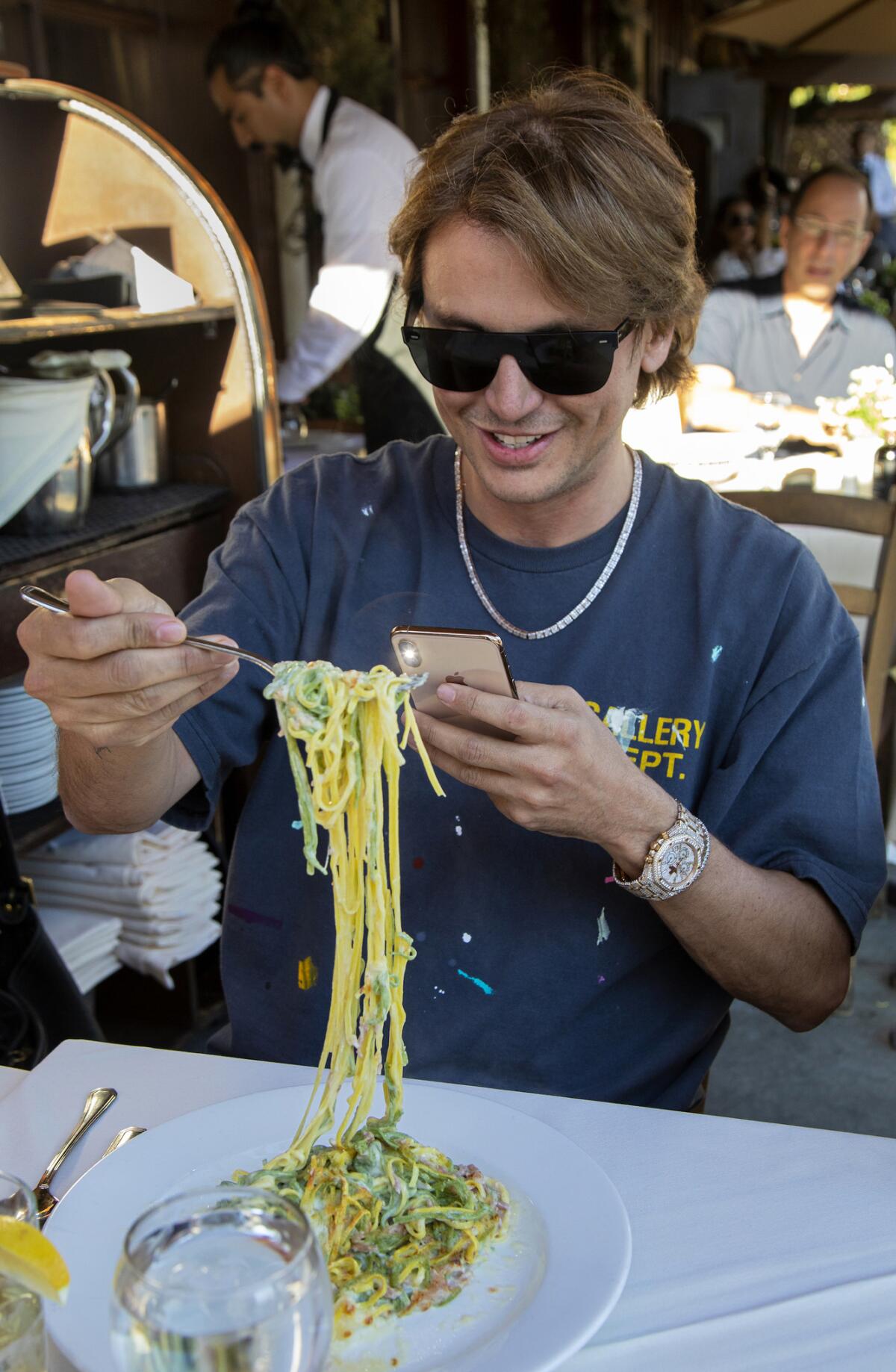
He aspires, in his own words, “to be like Paul Newman sauces.” Translation: Foodgod salad dressings and frozen dinners coming to a supermarket near you, even though, as he readily admits, “I have no food in my refrigerator.”
The fact that he has had no formal training, never cooks or cares about how things are made is of little concern to him.
“I don’t need to be a chef,” he explains. “I could get anybody to make anything. Look at Amazon — robots are working there. If my palate knows what’s delicious, I don’t need to make it. I need to sell it. Marie Callender’s but Foodgod.”
Here’s a preview of what his palate might yield in the frozen foods aisle:
“My big thing is, with pizza, I put salt on the plate. And then put it back down. So when you take a bite the crust is salty with flavor,” he says. “I’m so, so specific on stuff. It’s a nightmare. But I’m always like the nicest to waiters.”
Cheban does come off as polite and down-to-earth, but he has earned a reputation on Twitter as a jerk. “How dumb are u trash face… you pathetic zero,” he said to one user in 2013. To another, he wrote: “this is why u will always be a loser in life and I will live like a king you pathetic trash and ugly of course.”
“I was dumb back then,” he offers now (he has since deactivated his Twitter account). “I learned not to react to them. Because they don’t know how hard I work.”
I don’t need to be a chef .... If my palate knows what’s delicious, I don’t need to make it. I need to sell it. Marie Callender's, but Foodgod.
— Jonathan Cheban
Will fans eat up Foodgod products? He might have to start by convincing Kardashian.
“I don’t know if I would trust him to cook for me,” she teases. “He doesn’t even have like forks and stuff at his house. Yeah, I swear.”
This month Cheban posted his first Instagram food product review, for Sour Patch Kids cereal, with milk poured by his mother.
“Here it is,” he says, wide-eyed, holding up a neon green cereal box. “The smell is awesome. I hope they taste as good in the milk.” He holds the bowl close to his face, smelling the red, orange and green cereal. He uses a spoon to slosh it around a bit before taking a bite. His takeaway: “It’s like sour and sweet at the same time. I don’t know how that’s possible. It’s tangy and sweet. This is Foodgod-approved.”
‘Art is anything you can get away with’
On a recent balmy November afternoon, from a primo corner patio table at Il Pastaio in Beverly Hills, Cheban did his best to make his presence known to everyone.
He’s hamming it up, doing the Foodgod shtick, dive-bombing a fork and knife into a giant raviolo, which explodes, runny egg oozing from within. “It’s like giving birth to an egg!” He delights when a garganelli arrives with as many uni tongues as there are pasta tubes. “There’s uni with black … I don’t even know what kind of pasta that is,” he says as he shoots video of the dish with his iPhone. When the servers bring out a cheese wheel with tagliolini in the middle, he hollers, “I’ve got to do another video!”
Cheban is in his element, feeding on the increasing number of eyeballs trained in his direction, amping up his “wows” for the audience.
At one point, he tips his head back as a bow-tie-clad server stands over him, shaving black truffles directly into his gaping mouth.
Most of the truffles glance off his lips, fluttering down his diamond-encrusted chain and past the cursive “Foodgod” tattooed onto his right forearm before landing on his deliberately paint-splattered $165 T-shirt like super-expensive snowflakes.
“Truffle shower! God, it wasn’t in the forecast! Wow,” Cheban shouts with glee, his voice hovering somewhere between Valley girl and debauched European royalty.
As hundreds of dollars’ worth of truffles continue to fall, drivers, paparazzi and passersby ambling down Canon Drive stop to stare, all momentarily sucked into the Foodgod vortex.
Eat your way across L.A.
Get our weekly Tasting Notes newsletter for reviews, news and more.
You may occasionally receive promotional content from the Los Angeles Times.
